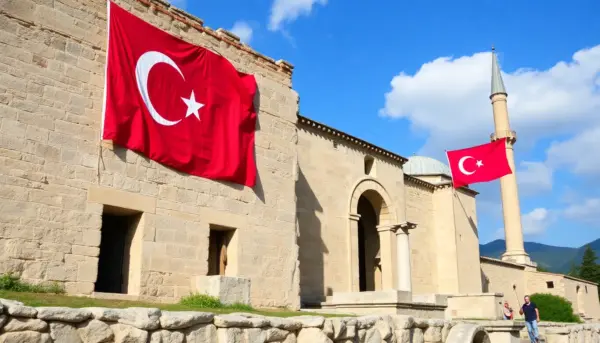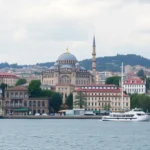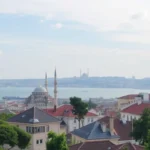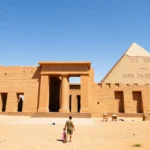Prepare yourself for an extraordinary journey through the history of Turkey, a land steeped in rich cultures, epic battles, and monumental empires. How can one encapsulate such a vibrant past into a few concise words? Let's explore this fascinating tapestry together. Buckle up, as we traverse through the ages from ancient civilizations to modern times, revealing the intricate layers that have shaped present-day Turkey. This brief history of Turkey will give you a deeper understanding of its complexities and significance in the world.
Turkey, strategically nestled between Europe and Asia, has been coveted by countless empires seeking dominance. This land has witnessed the rise and fall of remarkable figures and entities, from Alexander the Great to the Roman Empire and the Ottoman Empire, not to mention its pivotal role in the World Wars. Intrigued? Let’s dive into our comprehensive overview of Turkey's history!
The Early History of Turkey: From Prehistoric Times to the Byzantine Empire
The Prehistoric Era and Early Inhabitants
To grasp the essence of Turkey's history, we must start from the very beginning. Evidence suggests that the region was inhabited by hunter-gatherers during the Paleolithic era, with the earliest known communities emerging in Anatolia (present-day Asian Turkey). These early inhabitants laid the groundwork for the complex societies that would follow.
As time progressed, the Bronze Age saw the rise of significant trade routes connecting Troy to various parts of mainland Greece and the Aegean islands. This exchange facilitated not only the transfer of goods but also ideas and cultural practices, setting the stage for future conflicts.
The Hittites: Warriors and Diplomats
Advancing through history, the Hittites emerged as a formidable warrior culture. They are renowned for their military prowess, having engaged in notable battles, including against Ramses II of Egypt. Interestingly, their approach combined strength with strategic diplomacy; their alliance through marriage with the Egyptian royal family is often considered one of the earliest peace treaties in history.
At their zenith, the Hittites controlled vast territories, including parts of Cyprus, Mesopotamia, and Syria. However, their dominance was short-lived, as other tribes, such as the Thracians, gradually eclipsed their power.
The Legacy of Troy: Battles, Myths, and Pop Culture
During the Hittite era, the city of Troy became a focal point, thriving until the legendary Trojan War erupted around 1250 BC, famously immortalized by Homer in the Iliad. The tale intertwines myth and reality, captivating historians and audiences alike.
The story goes that Paris, a Trojan prince, abducted Helena, the wife of Menelaus, sparking a decade-long siege. Iconic figures such as Achilles and Odysseus entered the fray, showcasing the valor and tragedy of war. The clever ruse of the wooden horse ultimately led to the fall of Troy, teaching generations the timeless lesson: beware of Greeks bearing gifts.
Persian Influence and the Rise of Alexander the Great
By 1200 BC, Greek influence had spread across much of Turkey, particularly along its coast. This expansion did not sit well with Cyrus II, the great Persian emperor. The Persian Empire, once covering vast territories, including parts of modern-day Iran, sought to reclaim control over the region.
However, the tides turned with the emergence of Alexander the Great. His campaigns not only toppled the Persian Empire but also ushered in a fusion of Eastern and Western cultures that would lay the foundation for modern Turkey. After Alexander’s untimely death in 323 BC, the Hellenistic Period flourished, marked by the establishment of new city-states, including Pergamon.
The Roman Empire and the Byzantine Era
The Roman conquest of Anatolia began gradually during the 1st and 2nd centuries BC, integrating the diverse cultures of the region into the expanding Roman Empire. This period saw a blend of local customs with Roman governance, culminating in the division of the empire into Eastern and Western sections under Emperor Diocletian.
As the Western Roman Empire fell in 476 AD, the Eastern Roman Empire, or Byzantine Empire, thrived for nearly a millennium. Its capital, Constantinople (modern-day Istanbul), became a cultural and commercial hub until its fall to the Ottoman forces in 1453, marking a significant turning point in world history. This period is often summarized as a critical chapter in Turkey's history that laid the groundwork for future developments.
The Ottoman Empire: A Pinnacle of Power and Influence
The origins of the Ottoman Empire trace back further than Mehmed II's conquest of Constantinople. Initially a small state founded by Turkish tribes, it eventually expanded into one of the most powerful empires in history. At its height, under the rule of Süleyman I (Süleyman the Magnificent), the empire stretched across North Africa, the Middle East, and Southeast Europe, showcasing a rich tapestry of cultures and traditions.
This era was characterized by immense architectural advancements, with stunning mosques and palaces dotting the landscape, alongside bustling markets filled with exotic goods from the East. However, like all great empires, its decline began with military setbacks, notably the Battle of Lepanto in 1571, and the eventual independence movements in the Balkans during the 19th century.
The reasons for the empire's gradual downfall are numerous: internal strife, the rise of nationalism among diverse ethnic groups, and pressures from other rising powers like Napoleon and the Habsburgs. Despite attempts at modernization through movements such as the Young Turks, the empire could not withstand the pressures of the modern world.
Contemporary Turkey: A Nation Reborn
The Aftermath of World War I
As World War I unfolded, Turkey sided with the Central Powers, leading to significant territorial losses. The Ottoman Empire capitulated in 1918, and the subsequent Treaty of Sèvres in 1920 carved up its remaining territories, igniting a wave of nationalistic sentiments among the Turkish populace.
Amidst this chaos, a new leader emerged: Mustafa Kemal Atatürk, who spearheaded the Turkish War of Independence. His leadership culminated in the establishment of the Republic of Turkey on October 29, 1923, with Ankara designated as the capital. Atatürk's ambitious reforms aimed to modernize the country and align it more closely with Western ideals.
Atatürk's Reforms: A New Dawn for Turkey
Atatürk’s vision for Turkey was radical and transformative. His reforms included:
- Abolition of the sultanate and the caliphate
- Establishment of a secular education system
- Granting women the right to vote and hold public office
- Introduction of a new Turkish alphabet based on Latin script
- Legal reforms promoting civil marriage and gender equality
- Declaring Turkey a secular state
- Promotion of Western clothing styles over traditional garb
Atatürk is revered as the "Father of the Turks," and his legacy continues to shape Turkey's identity. However, his push for a singular national identity sometimes led to tensions with various ethnic groups within the country, marking the beginning of ongoing conflicts.
Turkey in the Modern Era
The latter half of the 20th century saw Turkey navigate a turbulent political landscape. The rise of the Democratic Party in the 1950s heralded an economic boom, but the 1960s brought political instability characterized by military coups and social unrest.
In 1984, tensions reached a boiling point as the Kurdish population launched a campaign for independence, igniting a conflict that remains unresolved to this day. The conflict has been marked by violence and human rights abuses, with the PKK (Kurdistan Workers' Party) leading the charge for Kurdish rights.
Fast forward to the early 2000s, where the political landscape shifted again with the rise of Recep Tayyip Erdoğan. Initially serving as Prime Minister, Erdoğan's leadership has been a source of division, with accusations of eroding Atatürk's secular legacy and moving towards an increasingly authoritarian regime.
His political party, AKP, has garnered significant support from conservative rural populations, while facing opposition from urban, secular factions. Erdoğan's foreign policy has also shifted, distancing Turkey from traditional allies and redefining its role on the global stage.
In 2013, widespread protests erupted in response to Erdoğan's authoritarian approaches, leading to brutal crackdowns. The failed coup attempt in 2016 further solidified Erdoğan's grip on power, allowing him to consolidate authority and suppress dissent.
In 2018, Turkey underwent a major shift by transitioning to a presidential system, effectively eliminating the role of Prime Minister. Erdoğan emerged victorious in the first presidential election under the new system, highlighting the deep divisions within Turkish society.
Today, Turkey faces numerous challenges, including ongoing conflicts in Syria, the refugee crisis, and strained relations with both the EU and the US. Yet, its strategic position remains crucial in global geopolitics, making Turkey a key player in international affairs.
As you navigate through this rich tapestry of Turkey's history, it’s clear that the country is a mosaic of diverse cultures, historical milestones, and enduring legacies, all contributing to its unique identity in the world today. Whether you're drawn to its imperial past, its tumultuous present, or its promising future, Turkey remains an endlessly fascinating subject for exploration. This Turkey history summary encapsulates the enduring significance of this remarkable nation.
| Save on your trip |
| Compare and find cheap flights here |
| Find accommodation at the best prices here |
| Book activities and excursions in Spanish here |
| 5% discount on your travel insurance IATI here |
| Book airport transfers here |
| Gift of 10€ when booking transport across Europe here |
| Find out how to withdraw money without fees here |
| 5% discount on your eSIM from Holafly here |
| Rent a car with the best deals here |
| Compare prices for van rentals here |
| The best books and travel guides here |
| All our articles about Turkey |




